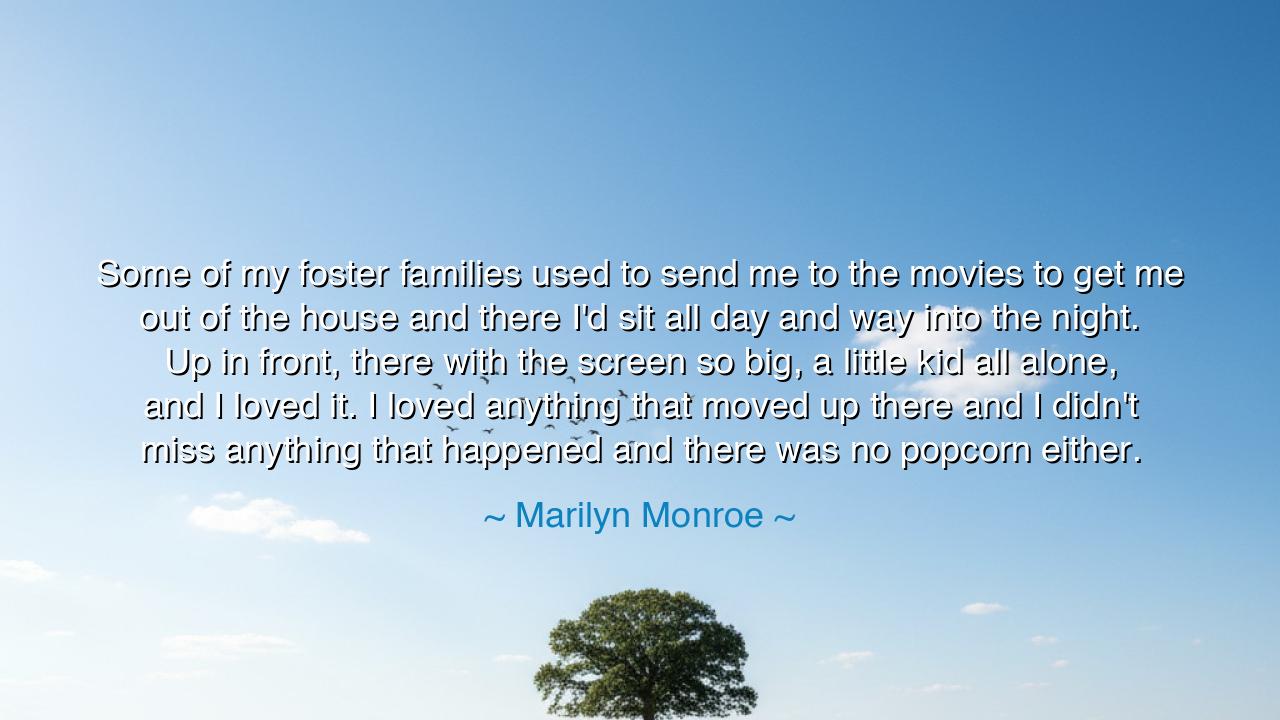
Some of my foster families used to send me to the movies to get
Some of my foster families used to send me to the movies to get me out of the house and there I'd sit all day and way into the night. Up in front, there with the screen so big, a little kid all alone, and I loved it. I loved anything that moved up there and I didn't miss anything that happened and there was no popcorn either.






When the luminous Marilyn Monroe—a woman adored by millions yet haunted by loneliness—spoke the words, “Some of my foster families used to send me to the movies to get me out of the house and there I'd sit all day and way into the night. Up in front, there with the screen so big, a little kid all alone, and I loved it. I loved anything that moved up there and I didn't miss anything that happened and there was no popcorn either,” she was not merely recalling a childhood memory. She was revealing the birth of a dream, the fragile seed from which her destiny would grow. Behind the glamour and the gold of Hollywood, behind the laughter and the longing, lived a child—alone, but filled with wonder.
In those darkened theaters, young Norma Jeane—as she was then—found her first sense of belonging. The flickering light of the screen became her sun, the actors her companions, the moving stories her education in emotion and beauty. For a child tossed between foster homes, uncertain of love or safety, the cinema offered something sacred: continuity, imagination, and a glimpse of worlds where loneliness could be transformed into art. There, in that temple of shadows and dreams, she learned that even the most fragile soul could shine. The screen became her mirror and her prophecy.
Marilyn’s words speak of both solitude and salvation. “A little kid all alone,” she says, and yet, “I loved it.” In that sentence lies the paradox of all artists: they are born from isolation, yet they turn it into beauty. She had no family to protect her, but she had the company of stories, faces, and movements that seemed larger than life. To the world, the cinema was entertainment; to her, it was communion. The silver screen did not merely show her fantasies—it whispered to her that she, too, might one day step into the light. And though she sat without popcorn or comfort, her spirit feasted on the motion of dreams.
History tells of other children who found greatness through the hunger of solitude. Charlie Chaplin, too, grew up in poverty and neglect, wandering the streets of London while his mother languished in illness. Yet, when he discovered the world of performance, he found not escape but purpose. His suffering became laughter for others; his emptiness became art. Like Marilyn, he learned that creation is the transformation of pain into beauty. The theater, the screen, the stage—they were not escapes from reality, but gateways to meaning.
Marilyn’s reflection also reminds us of the innocent eyes with which we once saw the world. The child who “didn’t miss anything that happened” is the soul of the true artist—the one who observes deeply, who absorbs every gesture, every silence, every shimmer of emotion. In those hours before the glowing screen, she trained her heart to feel and her gaze to notice. That is why, later in life, her performances carried an almost unbearable truth: behind the glamour, one could still see the girl who had once watched the world with open wonder, seeking connection through imitation and art.
But there is also sorrow in her remembrance—a quiet confession of abandonment. The foster families sent her away not for joy, but for absence; they wished her gone. Yet even in rejection, she found a gift. Alone in the theater, she discovered what many never do—that meaning can grow even from neglect, and that beauty can rise from loneliness like a flower from the dust. The human spirit, when filled with imagination, can turn exile into revelation.
The lesson her story imparts is both tender and profound: never despise the small sanctuaries where your soul finds light. For Marilyn, it was the movie theater; for another, it may be the pages of a book, the notes of a song, the brush upon canvas, or the silence of the stars. Whatever place makes your heart awaken—guard it. Within such solitude, greatness begins to stir. Do not curse your loneliness; let it teach you to see.
So, to all who have sat “alone before the screen,” or wandered the world in search of belonging, remember Marilyn’s truth: even the abandoned child can become a light to others. The loneliness that once felt like exile may one day become the wellspring of your art, your compassion, your strength. For those who learn to love the moving light in the darkness—whether it is on a screen, in a dream, or within their own heart—will never be truly alone again.






AAdministratorAdministrator
Welcome, honored guests. Please leave a comment, we will respond soon